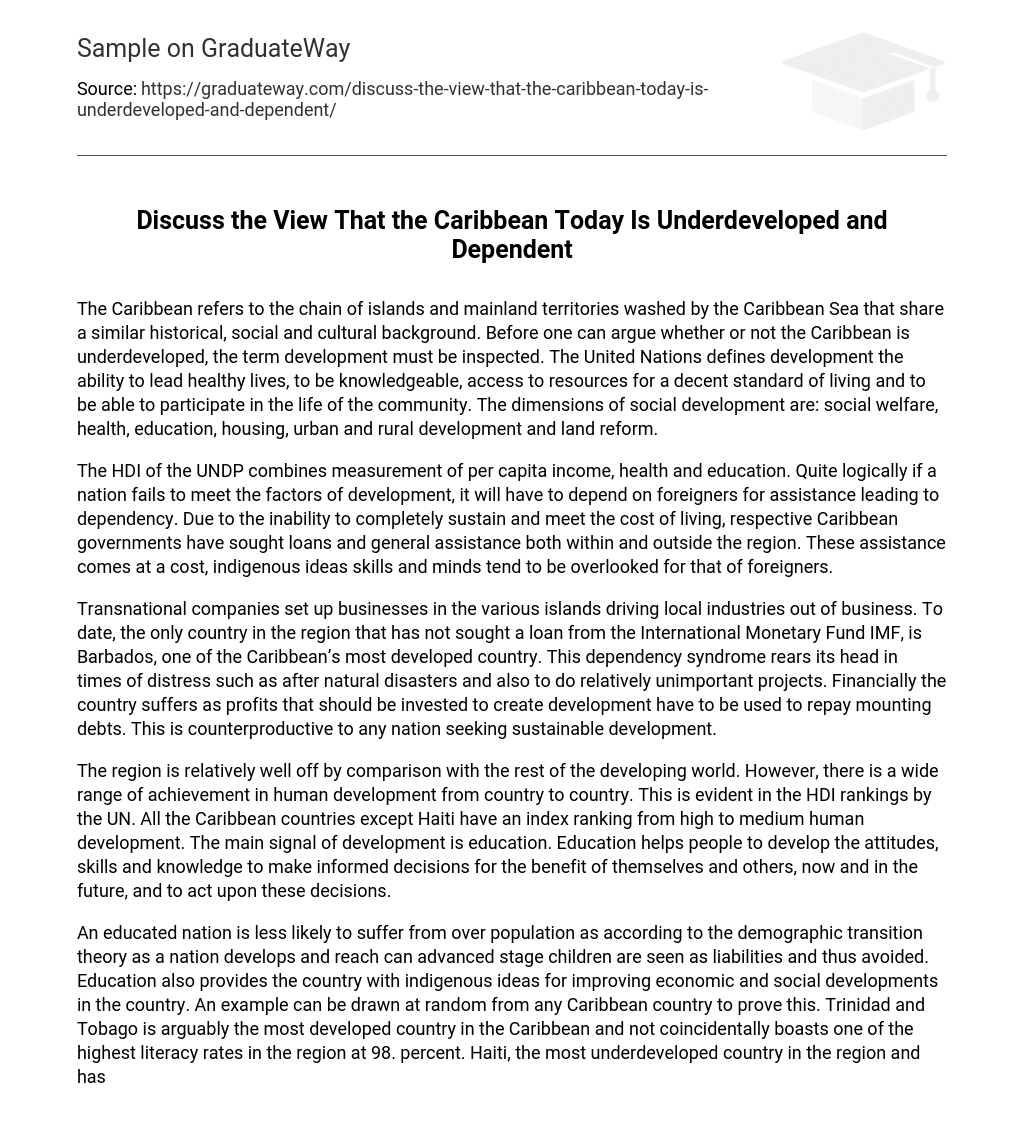The Caribbean, which is made up of islands and mainland territories surrounded by the Caribbean Sea, shares a common historical, social, and cultural background. Understanding the definition of development is essential to assessing progress in this region. The United Nations defines development as having access to healthcare, education, resources for a satisfactory standard of living, and participation in community life. Social development encompasses different aspects such as social welfare, education, healthcare, housing, urban and rural development, and land reform.
The Human Development Index (HDI) is calculated by the United Nations Development Programme (UNDP) and takes into account per capita income, health, and education. Countries that do not meet these development indicators rely on foreign aid. Caribbean governments have sought loans and assistance from both domestic and international sources because they cannot fully support the cost of living. However, this assistance often prioritizes ideas, skills, and talent from foreigners over indigenous ones.
The establishment of multinational corporations on various islands results in the displacement of local industries, causing dependency during crises and even for small ventures. Barbados, an advanced Caribbean nation, stands out as the only country in the region not seeking a loan from the International Monetary Fund (IMF). However, financial obligations arising from these corporations have detrimental effects on countries like Barbados, redirecting resources meant for development towards debt repayment and hindering sustainable progress.
The Caribbean region experiences varying levels of human development across countries, as demonstrated by the United Nations’ HDI rankings. Despite this diversity, all Caribbean countries (excluding Haiti) have relatively high to medium rankings on the human development index. Education plays a critical role in development by equipping individuals with the necessary mindset, skills, and knowledge to make informed decisions for their own and others’ welfare in both present and future contexts. This enables them to effectively implement those decisions.
The demographic transition theory highlights the importance of education in preventing overpopulation and promoting development. As a country progresses, attitudes towards children change, leading to a decrease in their perceived burden. Education also contributes to economic and social progress within nations. In the Caribbean region, Trinidad and Tobago stands out as the most developed country with a literacy rate of 98%, while Haiti lags behind with a literacy rate of 62.1%. This correlation between education and development is not coincidental.
Alongside education, healthcare poses significant challenges in the Caribbean region, hindering sustainable development. Jamaica has faced particular struggles with its healthcare system due to shortages of medical personnel, health facilities, medicine, and surgical equipment. These deficiencies have had negative effects on public well-being.
Despite the fact that the country offers free healthcare to its citizens, it encounters difficulties such as hospitals being overcrowded and understaffed, as well as pharmacies that are poorly managed. Furthermore, due to limited financial resources, the country relies on foreign countries for medication supplies. In contrast, developed nations like the US and UK not only provide free healthcare but also have a sufficient number of medical professionals and support staff to ensure an effective healthcare system.
Even though Jamaica is not considered an underdeveloped country, it is still classified as a developing nation because its level of development is lower than that of first world countries. The provision of social welfare plays a vital role in evaluating social development and determining how effectively a country can support its unemployable and unemployed citizens. It is crucial to guarantee adequate social welfare in order to break the cycle of illiteracy and poverty. These programs aim to offer equal opportunities for marginalized individuals and ensure that children can access education regardless of their parents’ economic situation.
Protests have erupted in developed countries over the decision to raise the retirement age to 65 years. However, in Jamaica and other Caribbean nations, this change is seen as a solution to address issues caused by inadequate pensions. Although welfare packages for children from impoverished families may not match those offered in Canada or the United States, they still provide essential necessities and contribute to their development. Overall, despite not being highly developed, the Caribbean region has made progress. With the exception of Haiti, all Caribbean territories have a medium to high Human Development Index according to the United Nations Development Program. The primary challenge faced by this region is dependency; nevertheless, there is optimism that an educated population valuing healthcare and social welfare can overcome this obstacle in the near future.





